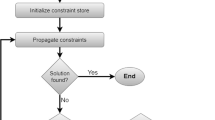Abstract
As the strongly NP-hard problem, the hybrid flow-shop problem with multiprocessor tasks (HFSPMT) has gained increasing attention due to its academic significance and wide application background. For many heuristics and meta-heuristics to solve the HFSPMT, decoding method is the key element to decode sequences to schedules, which has great effect on the solution quality. To narrow the idle time between the consecutive operations in the processor and to increase the flexibility in selecting processors to schedule the following operations, several rules are proposed to adjust sequences to minimize the makespan of the HFSPMT. Based on the rules, a novel and effective decoding method named forward scheduling (FS) is proposed in this paper for solving the HFSPMT. At each stage, it first decodes the solution according to the non-decreasing order of the jobs’ completion times at the previous stage, and then it adjusts the processing order of the jobs dynamically according to the rules to obtain potentially better schedule. Numerical results based on the well-known benchmarks and comparisons with some existing decoding methods demonstrate the effectiveness of the proposed FS decoding method.
Similar content being viewed by others
Reference
Ruiz R, Antonio VR (2010) The hybrid flow shop scheduling problem. Eur J Oper Res 205(1):1–18
Alaykýran K, Engin O, Döyen A (2007) Using ant colony optimization to solve hybrid flow shop problems. Int J Adv Manuf Technol 35:541–550
Gholami M, Zandieh M, Alem-Tabriz A (2009) Scheduling hybrid flow shop with sequence-dependent setup times and machines with random breakdowns. Int J Adv Manuf Technol 42:189–201
Rashidi E, Jahandar M, Zandieh M (2010) An improved hybrid multi-objective parallel genetic algorithm for hybrid flow shop scheduling with unrelated parallel machines. Int J Adv Manuf Technol 49:1129–1139
Drozdowski M (1996) Scheduling multiprocessor tasks—an overview. Eur J Oper Res 94(2):215–230
Guan Y, Xiao WQ, Cheung RK, Li CL (2002) A multiprocessor task scheduling model for berth allocation: heuristic and worst-case analysis. Oper Res Lett 30:343–350
Oğuz C, Zinder Y, Do VH, Janiak A, Lichtenstein M (2004) Hybrid flow-shop scheduling problems with multiprocessor task systems. Eur J Oper Res 152:115–131
Bruker P, Schlie R (1990) Job-shop scheduling with multi-purpose machines. Computing 45(4):369–375
Ercan MF, Oğuz C (2005) Performance of local search heuristics on scheduling a class of pipelined multiprocessor tasks. Comput Electr Eng 31:537–555
Bertel S, Billaut JC (2004) A genetic algorithm for an industrial multiprocessor flow shop scheduling with recirculation. Eur J Oper Res 159(3):651–662
Kahraman C, Engin O, Kaya I, Ozturk RE (2010) Multiprocessor task scheduling in multistage hybrid flow-shops: a parallel greedy algorithm approach. Applied Soft Computing 10:1293–1300
Chen J, Lee CY (1999) General multiprocessor task scheduling. Nav Res Logist 46:57–74
Lee CY, Cai X (1999) Secheduling one and two-processor tasks on two parallel processors. IIE Trans 31:445–455
Krawczyk H, Kubale M (1985) An approximation algorithm for the permutation for diagnostic test scheduling in multicomputer systems. IEEE Trans Comput 34:869–872
Oğuz C, Ercan MF (2005) A genetic algorithm for hybrid flow-shop scheduling with multiprocessor tasks. J Sched 8:323–351
Błażewicz J, Dell’Olmo P, Drozdowski M, Speranza MG (1992) Scheduling multiprocessor tasks on three dedicated processors. Inf Process Lett 41:275–280
Brucker P, Knust S, Roper Y (2000) Scheduling UET task systems with concurrency on two parallel identical processors. Methods of Operations Research 52(3):369–387
Lloyd EL (1981) Concurrent task systems. Oper Res 106:226–253
Du J, Leung YT (1989) Complexity of scheduling parallel task systems. SIAM J Discret Math 2:473–487
Gupta J, Tune E (1988) Minimizing tardy jobs in a two-stage hybrid flowshop. Int J Prod Res 36(9):2397–2417
Gupta J (1988) Two-stage hybrid flowshop scheduling problem. J Oper Res Soc 39(4):359–364
Haouari R, M’Hallah R (1997) Heuristic algorithm for the two-stage hybrid flowshop problem. Operation Research Letters 21:42–53
Riane F, Artiba A, Elmaghraby SE (1998) A hybrid three-stage flowshop problem: efficient heuristics to minimize makespan. Eur J Oper Res 109:321–329
Oğuz C, Ercan MF, Cheng TCE, Fung YF (2003) Heuristic algorithms for multiprocessor task scheduling in a two-stage hybrid flow-shop. Eur J Oper Res 149:390–403
Oğuz C, Ercan MF (1997) Scheduling multiprocessor tasks in a two-stage flow-shop environment. Comput Ind Eng 33:269–272
Sivrikaya-Serifoğlu F, Ulusoy G (2004) Multiprocessor task scheduling in multistage hybrid flow-shops: a genetic algorithm approach. J Oper Res Soc 55:504–512
Ying K-C, Lin S-W (2006) Multiprocessor task scheduling in multistage hybrid flow-shops: an ant colony system approach. Int J Prod Res 44:3161–3177
Tseng C-T, Liao C-J (2008) A particle swarm optimization algorithm for hybrid flow-shop scheduling with multiprocessor tasks. Int J Prod Res 46:4655–4670
Wang HM, Chou FD, Wu FC (2010) A simulated annealing for hybrid flow shop scheduling with multiprocessor tasks to minimize makespan. Int J Adv Manuf Technol 53:761–776
Pan QK, Wang L, Gao L, Li JQ (2011) An effective shuffled frog-leaping algorithm for lot-streaming flow shop scheduling problem. Int J Adv Manuf Technol 52:699–713
Author information
Authors and Affiliations
Corresponding author
Rights and permissions
About this article
Cite this article
Wang, L., Xu, Y., Zhou, G. et al. A novel decoding method for the hybrid flow-shop scheduling problem with multiprocessor tasks. Int J Adv Manuf Technol 59, 1113–1125 (2012). https://doi.org/10.1007/s00170-011-3541-x
Received:
Accepted:
Published:
Issue Date:
DOI: https://doi.org/10.1007/s00170-011-3541-x




